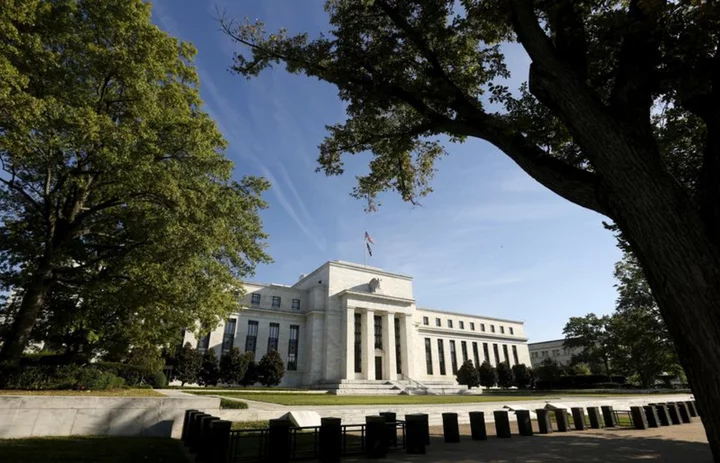By Jamie McGeever
ORLANDO, Florida If cash has been king, the Fed may be plotting regicide.
As the Federal Reserve's policy 'pivot' draws into view, investors face a $6 trillion question - where to deploy this record amount of cash if the beefy interest rate returns drawing people there evaporate again?
Earning short-term rates not seen for well over a decade, the attraction of 5% cash is considerable and raises a high bar for other assets to perform in such an uncertain economic environment.
But once the first Fed cut comes into view, that money will move rapidly out the maturity curve and into riskier assets. Doubly fast if, as is consensus, those cuts arrive without being forced by recession.
And the scramble to lock into high long-term coupons could quickly become a stampede.
Fed Governor Christopher Waller this week gave the strongest hint yet that the first Fed cut may be closer than many had been anticipating, and rates and bond traders have reacted swiftly.
Rates futures markets are now pricing in more than 100 basis points of cuts next year starting in May, and the two-year Treasury yield is its lowest since July - it has slumped 35 basis points this week alone.
A recent report by BlackRock, the world's largest asset manager, notes that on average, cash returns 4.5% in the year following the final Fed rate hike, significantly underperforming a wide array of asset classes.
This becomes particularly acute once the Fed actually starts cutting rates, as the opportunity cost of owning an asset whose nominal and real returns are dwindling relative to other asset classes is magnified even further.
Emerging market debt, U.S. equities and dividend stocks are investments which, on average, provide the juiciest returns of 20% or more in the 12 months after the Fed's last rate hike, the BlackRock report finds.
"Clients should be deploying cash into assets that are consistent with their base case scenario for 2024," says Justin Christofel, co-head of Income Investing for BlackRock's Multi-Asset Strategies & Solutions group and one of the authors of the report.
"There's a lot of dry powder out there and that can power decent returns," he adds.
MAKE CASH TRASH AGAIN?
There certainly is a lot of dry powder.
The latest figures tracked by ICI, a global funds industry body, show that total money market fund assets stood at a record high $5.76 trillion on Nov. 21. Of that, $2.24 trillion is in retail investor funds and $3.52 trillion is in institutional funds.
That has risen substantially since the Fed started its rate-hiking cycle early last year.
According to Bank of America, investors have poured $1.2 trillion into money market funds so far this year. Cash has been investors' favorite destination in recent years, and with an annual return tracking 4.5%, it is on course for its best year since 2007.
BofA's private clients' cash holdings as a share of their total $3.2 trillion assets under management is currently 12%, close to the average level over the past 20 years of around 13%.
If their wider holdings are representative of investor positioning more broadly, a negative correlation between fixed income and equities could soon emerge.
BofA private clients' share of equities stands at 60% of total assets, above the longer term average of 56%, and their debt allocations is currently 21.5%, below the average 26%.
With market-based borrowing costs heading lower in anticipation of official rates being cut next year, many investors will be strongly tempted to lock in yields of 4.5% across the U.S. Treasuries curve now.
Those with a more benign view of the economy will be more risk-friendly. Analysts at Goldman Sachs, BofA and Deutsche Bank, among others, see the S&P 500 hitting new all-time highs of at least 5000 next year, while U.S. high yield debt is still yielding more than 8% nominally.
Ultimately, fund managers will have to work that bit harder and be more selective, as the easy money from simply parking clients' investment in cash can no longer be made.
"A negative bond-equity correlation paves the way for the only free lunch in finance: diversification," Robeco's investment team says.
Bridgewater founder Ray Dalio said as recently as last month that cash still holds "relatively attractive appeal," offering a real return of around 1.5% with no price risk.
It might not be long, however, before he veers back towards his bluntly-articulated view from early 2020 that "cash is trash."
(The opinions expressed here are those of the author, a columnist for Reuters.)
(By Jamie McGeever; Editing by Josie Kao)

